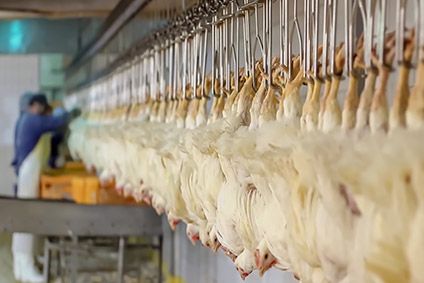
The UK must accept US food standards in any trade deal, the head of the American Farm Bureau has insisted, arguing fears over quality are not based on science.
Zippy Duvall, the president of the bureau, told the BBC concerns among some in the UK food industry and among some of the country’s consumers about US food were unfounded.

Discover B2B Marketing That Performs
Combine business intelligence and editorial excellence to reach engaged professionals across 36 leading media platforms.
The practice in parts of the US supply chain to wash poultry in chlorine has been held up by some UK food advocates as an example of the lower food standards in America that may have to be accepted in the event of a trade deal between the two countries.
The controversy over the practice, banned by the EU, is less about the washing itself and more about whether its use indicates low hygiene standards elsewhere in the chain. US poultry industry professionals have defended the practice.
“We want to make sure those same standards are used,” Duvall told the UK broadcaster when asked about the prospect of a trade agreement. “We’d also like to have the conversation about the scientific basis behind those perceptions of our food here.
“I grow poultry myself. About 750,000 chickens come off my farm. I grow them under a contract. All of my chicken ends up at [US fast-food chain] Chick-Fil-A and this week Chick-Fil-A was voted the number fast-food organisation in America. If there’s something wrong with that chicken it’s surely not science-based because people sure do love it.”

US Tariffs are shifting - will you react or anticipate?
Don’t let policy changes catch you off guard. Stay proactive with real-time data and expert analysis.
By GlobalDataAsked if he believed any fears in the UK were not based on science, Duvall added: “That’s exactly right. We feed 300m Americans with that food and, if there was something wrong with it, our federal inspection systems would not be allowing us to use it. It is supported by science.”
Earlier this week, John Bolton, President Trump’s national security adviser, suggested the UK, in the wake of leaving the EU, could sign trade deals with the US sector by sector, with the “ultimate end result” being a comprehensive agreement.
Duvall told the BBC any deal between the two countries must include agriculture.
“Agriculture in America would be standing on the steps everywhere saying that we want to make sure that agriculture is part of every trade treaty across the world,” Duvall said. “To have a trade treaty and not discuss agriculture would be turning your back on rural America and that’s where a big part of our population lives.”
UK trade union Unite this afternoon argued “public health standards” in the country “could be compromised” if chlorine-washed chicken imports from the US were accepted under a trade agreement.
“The debate over chlorinated chicken is the tip of the iceberg of what could happen with a post-Brexit no deal scenario when Tory ministers go to Washington with a begging bowl to agree a one-sided free trade agreement with the Trump administration,” Bev Clarkson, Unite’s national officer for the food, drink and agriculture sectors, said.
“There is a good reason why the EU banned chlorinated chicken in the late 1990s – it feared it could mask poor hygiene standards. We believe that public health standards could be compromised if such chicken and also hormone enhanced US beef were allowed to be sold in the UK.”





